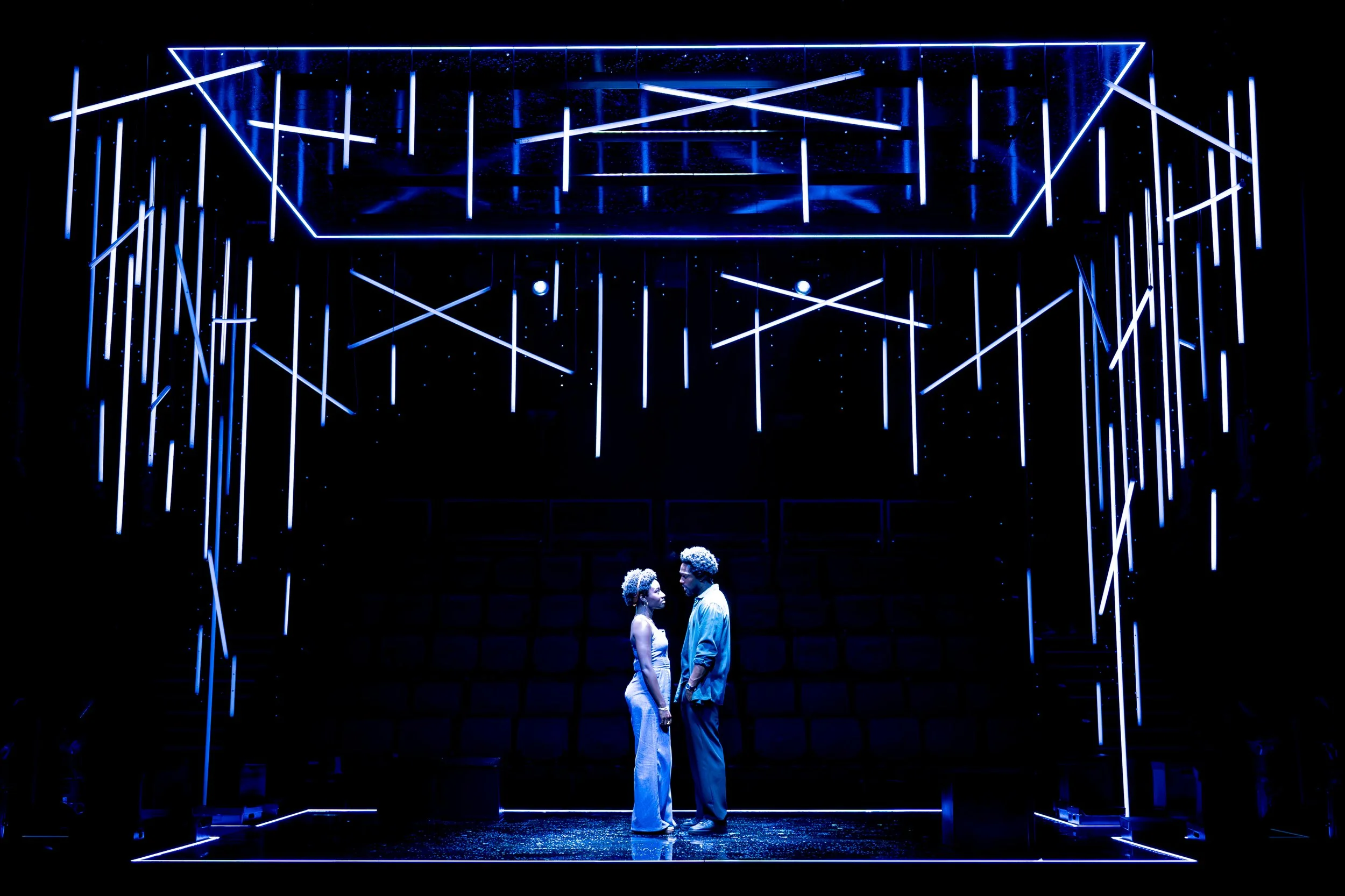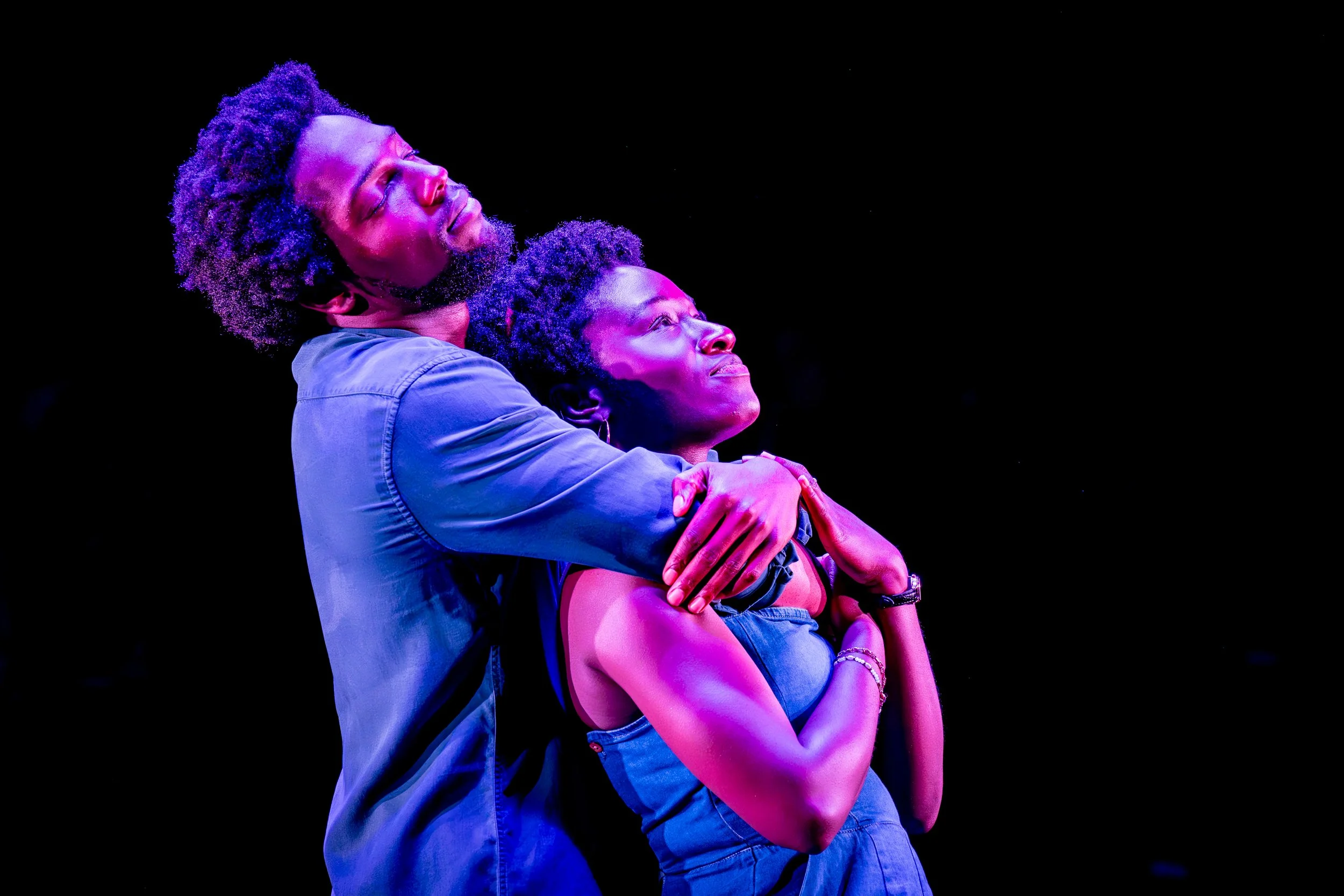"If You Don't See It, Write It": West End Stars Benedict Lombe and Heather Agyepong on Trailblazing British Theatre with 'Shifters'
Writer Benedict Lombe and actor Heather Agyepong talk to The Culture Crypt about the universality of love, the notorious 'vomit draft' and their much-buzzed-about leading man, Tosin Cole.
The first time a Black British woman staged a play in the West End was as recently as 2018. To mourn the depth of storytelling that we've been retrospectively robbed of in two centuries of British theatre would be too upsetting. All the more reason to clamour around Benedict Lombe, the third Black British woman in this historic win, and her rapturous romance Shifters, playing at the Duke of York's Theatre from 12 August to 12 October.
The play follows the push and pull of long-lost lovers Des and Dre, played by actors Heather Agyepong and Tosin Cole. The push (breaking up, building lives apart) and the pull (reacquainting after eight years) make for a rousing watch filled with giddiness, nostalgia, and, for some, the lingering impulse to text your ex.
Ahead of the play's transfer to the West End, I spoke with playwright Lombe and lead actor Agyepong about the universality of love, the notorious 'vomit draft' and, in his absence, their much-buzzed-about leading man. But first, how does the second run at the West End compare to the Bush Theatre? "There's still that level of excitement", says Agyepong. "We knew the story was important, but it was only after the response, with people saying that crowds were queuing up for returns and it being sold out, that I thought, 'Oh gosh, this is really important.'"
In our conversation, it's clear that Lombe loves love—and loves writing about it too. "My favourite kind of love stories are the ones where you feel like you shouldn't be there," Lombe says. "I want us as an audience to fall in love with Des and Dre as we see them fall in love with each other." It should come as no surprise that a play that amounts to pillow talk with an audience—and between two gorgeous leads—has become a barnstorming hit among theatregoers. But in all its swoon-worthiness, the sap for you cynics out there is cut with the sour realisation that we don't really get this, do we?
Shifters is radical in its slice-of-life depiction of Black love on stage. Deep sighs abound, not from the fly-on-the-wall thralls of intimacy but from the feeling that we 'needed this'. After hearing these responses from the audience, Lombe admits, "It feels great, and I share in the feeling!" Since the play serves as a character study of two complex leads, she laments that "it's still unfortunately rare for us to get the freedom to be able to portray two Black British people on stage in a way that isn't rooted in racial trauma."
The play's lightness is what drew Agyepong to the story. Fresh from playing Ama in School Girls; Or, The African Mean Girls Play and from exhibiting mesmerising artworks, she says she was hesitant to get stuck into yet another production but recalls how the Shifters script beckoned her back to the stage: "people can write some really trope-y stuff sometimes about what it means to be Black. But [Lombe] writes about the real messiness of humanity which you don't often get and is what I loved."
“People can write some really trope-y stuff sometimes about what it means to be Black. But [Lombe] writes about the real messiness of humanity”
With Shifters, Lombe has found a sweet spot. "It's definitely a play that celebrates its Blackness unambiguously but refuses to be solely reduced to that. Our audiences come in, and they feel seen, like 'okay this is for us' and audiences outside of us are able to also experience a deep connection with the play because love is so all-encompassing and universal." Here lies the play's success in this delicate balancing act of clear cultural specificities and the tender handling of universally resonant themes that the love plot provides—and this was conscious.
After staging her last play, Lava, Lombe recalled a conversation with director Lynette Linton where they both scoped the theatre landscape for "what was out there at the moment and what we weren't seeing… It's really cool to see more Black British people in love stories now and occupying those spaces." But from their observations, there was a key sticking point. "What we were seeing on stage was often when that did happen, those stories weren't specifically written for them, and we could tell!"
By way of patching up this shortcoming, the character of Des, who is British-Congolese like Lombe herself, and Dre, who is British-Nigerian like Cole, reflect cultural specificities of the African diaspora in ways that aren't messily shoehorned in. Approaching the writing by "rooting it in things you don't have to explain like our food, our language, our music and all of these things that are so important in the makeup of who we are but not so notable to us," when it came to creating a story that felt authentic, "it was sort of a given that it should exist," says Lombe.
In an arena as culturally insular as the theatre, compared to the relatively more democratic world of film, television and streaming, a live production ensures a lucky few get to experience the story. That few, a report found, were 93% white. This makes residency for Black playwrights in this medium especially significant. Representation is often hollowly discussed within the framework of 'seeing' oneself on screen. With minority audiences as underrepresented as they are in theatre, to spark more authentic stories, this should be adjusted to 'seeing' ourselves in seats.
So, it follows that Lombe's plight as a playwright is personal. "If you don't see it, write it. There's always going to be some part of me trying to put my people on the map," she says. "I'm always going to make sure I write my culture in spaces and in stories, to be seen and heard and received in platforms where they don't get that—to normalise those experiences."
“If you don’t see it, write it. There’s always going to be some part of me trying to put my people on the map”
Due to tight timelines in producing Shifters, the first draft or 'vomit draft' as Lombe calls it, went out to actors early in the process: "That wasn't even the draft that I would show the person I trust most in the world. I remember that whole casting process and being deeply uncomfortable with what people had to come in with because it didn't even come close to the thing that I wanted to do with the play. Luckily we had amazing actors who were able to see the vision." Enter Heather and Tosin.
As premature as the draft apparently was, the characters and their essential qualities remained intact throughout. "Des is quite cerebral and Dre is quite action-led", adds Agyepong, illustrating their own Dionysian-Apollonian struggle. But while their core never changed, dialogue and action underwent many refinements and still do.
"Every now and then, I'll tweak something because I'll think, 'that doesn't feel right for Heather to say that as Des' so I'll tweak it until it feels completely natural. They'll say something, or they'll forget a line in rehearsal, and I'll think, 'actually that feels better, let's rejig that so that it all feels completely seamless.' That's the attempt, to achieve a kind of seamlessness so that we feel like we have somehow been invited into these two characters' world."
While I allow this to blow my mind, particularly the idea that Agyepong and Cole end up colouring their characters with their quirks, this active edit unfurls yet another layer of authenticity, a physical one between actor and character. Even within our conversation, there's a sense that the script is mouldable still, as Lombe poses questions to Agyepong for further research, drawing more insight from her character. She cheerfully wraps up the chat, saying it was "helpful". The notebook is never dry.
And why should it be? The marathon of a play stands at 90–100 minutes with no intervals and solely consists of Agyepong and Cole as its leading players, eight times a week for several weeks. To be able to carry that out requires trust in the other. "It's a lot of graft!" Agyepong admits. "Tosin's commitment to being uncomfortable allowed me to feel comfortable. There were loads of moments like that, and he was really like that from the jump."
As the release of Netflix's smash hit superhero series Supacell catapults Cole (Michael) as one to watch, I wonder how they will navigate being Supacell-adjacent. There's undoubtedly a rising star in Agyepong, too, so I ask Lombe: will there be a Shifters adaptation in the works? "Definitely open to it, 'working on something' is what I think I'm allowed to say…"
Ready to watch Shifters? Get your tickets here.




